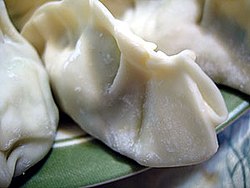餃子: difference between revisions
Jump to navigation
Jump to search
Content deleted Content added
→Japanese: +formatting +Teochew reading, which is quite close to the JA |
or do these go to the headword template? @user:dine2016 |
||
| Line 39: | Line 39: | ||
[[Image:Jiaozi-close-look.jpg|thumb|250px|{{lang|ja|餃子}} (''gyōza''): a plate of raw [[dumpling]]s or [[potsticker]]s, ready to be [[fried]], [[boiled]], or [[steamed]].]] |
[[Image:Jiaozi-close-look.jpg|thumb|250px|{{lang|ja|餃子}} (''gyōza''): a plate of raw [[dumpling]]s or [[potsticker]]s, ready to be [[fried]], [[boiled]], or [[steamed]].]] |
||
</div> |
</div> |
||
{{ja-kanjitab|sort=きようさ'|yomi=kanyoon,irr|ぎょう|ざ |
{{ja-kanjitab|sort=きようさ'|yomi=kanyoon,irr|ぎょう|ざ}} |
||
[[File:餃子.jpg|thumb|250px|{{m|ja|餃子}} [[sign]].]] |
[[File:餃子.jpg|thumb|250px|{{m|ja|餃子}} [[sign]].]] |
||
| Line 51: | Line 51: | ||
===Noun=== |
===Noun=== |
||
{{ja-noun|ぎょうざ}} |
{{ja-noun|ぎょうざ|ギョウザ|ギョーザ}} |
||
# [[gyoza]]: a kind of [[dumpling]] or [[potsticker]] with a thin [[skin]], traditionally made with [[minced]] [[pork]] and then [[fried]], [[boiled]], or [[steamed]] |
# [[gyoza]]: a kind of [[dumpling]] or [[potsticker]] with a thin [[skin]], traditionally made with [[minced]] [[pork]] and then [[fried]], [[boiled]], or [[steamed]] |
||
Revision as of 19:26, 30 January 2020
See also: 饺子
Chinese
| dumplings with meat filling | child; son; (noun suffix) child; son; (noun suffix); small thing; seed; egg; 1st earthly branch; 11 p.m.–1 a.m., midnight | ||
|---|---|---|---|
| trad. (餃子) | 餃 | 子 | |
| simp. (饺子) | 饺 | 子 | |
Pronunciation
- Mandarin
- (Standard)
- (Chengdu, Sichuanese Pinyin): jiao3 zi3-2
- (Dungan, Cyrillic and Wiktionary): җёзы (ži͡ozɨ, II-I)
- Cantonese (Jyutping): gaau2 zi2
- Mandarin
- (Standard Chinese)
- Hanyu Pinyin:
- Zhuyin: ㄐㄧㄠˇ ˙ㄗ
- Tongyong Pinyin: jiǎozi̊h
- Wade–Giles: chiao3-tzŭ5
- Yale: jyǎu-dz
- Gwoyeu Romatzyh: jeau.tzy
- Palladius: цзяоцзы (czjaoczy)
- Sinological IPA (key): /t͡ɕi̯ɑʊ̯²¹⁴ d͡z̥z̩⁴/
- Homophones:
[Show/Hide] 角子
餃子/饺子
- (Chengdu)
- Sichuanese Pinyin: jiao3 zi3-2
- Scuanxua Ladinxua Xin Wenz: giaoz
- Sinological IPA (key): /t͡ɕiau⁵³ t͡sz̩⁵³⁻²¹/
- (Dungan)
- Cyrillic and Wiktionary: җёзы (ži͡ozɨ, II-I)
- Sinological IPA (key): /t͡ɕiɔː⁵¹ t͡sz̩²⁴/
- (Note: Dungan pronunciation is currently experimental and may be inaccurate.)
- (Standard Chinese)
- Cantonese
- (Standard Cantonese, Guangzhou–Hong Kong)+
- Jyutping: gaau2 zi2
- Yale: gáau jí
- Cantonese Pinyin: gaau2 dzi2
- Guangdong Romanization: gao2 ji2
- Sinological IPA (key): /kaːu̯³⁵ t͡siː³⁵/
- (Standard Cantonese, Guangzhou–Hong Kong)+
Noun
(deprecated template usage) 餃子
- Chinese crescent-shaped dumpling; jiaozi
- (dialectal) wonton (Chinese dumpling stuffed with meat or seafood and vegetables)
Synonyms
Hyponyms
Derived terms
Lua error in Module:zh/templates at line 32: This template has been deprecated. Please use Template:col3 instead.
Japanese

| Kanji in this term | |
|---|---|
| 餃 | 子 |
| ぎょう Hyōgai |
ざ Grade: 1 |
| kan'yōon | irregular |

Etymology
Borrowed from Chinese 餃子/饺子,[1][2][3] possibly from a Mandarin dialect without palatalization (i.e. *giaozi), or from a non-Mandarin variety of Chinese. Compare the Teochew dialect Min Nan reading of this spelling as giao2 ze2.
Compare also Korean 교자 (餃子, gyoja), although the word for "jiaozi" and "gyoza" in Korean is 만두 (饅頭, mandu).
Pronunciation
Noun
- gyoza: a kind of dumpling or potsticker with a thin skin, traditionally made with minced pork and then fried, boiled, or steamed
Derived terms
Derived terms
References
- ↑ 1.0 1.1 Matsumura, Akira, editor (2006), 大辞林 [Daijirin] (in Japanese), Third edition, Tokyo: Sanseidō, →ISBN
- ^ Matsumura, Akira (1995) 大辞泉 [Daijisen] (in Japanese), First edition, Tokyo: Shogakukan, →ISBN
- ↑ 3.0 3.1 NHK Broadcasting Culture Research Institute, editor (1998), NHK日本語発音アクセント辞典 [NHK Japanese Pronunciation Accent Dictionary] (in Japanese), Tokyo: NHK Publishing, Inc., →ISBN
Categories:
- Mandarin terms with audio links
- Mandarin terms with homophones
- Chinese lemmas
- Mandarin lemmas
- Sichuanese lemmas
- Dungan lemmas
- Cantonese lemmas
- Chinese nouns
- Mandarin nouns
- Sichuanese nouns
- Dungan nouns
- Cantonese nouns
- Chinese terms with IPA pronunciation
- Chinese terms spelled with 餃
- Chinese terms spelled with 子
- Chinese dialectal terms
- Beginning Mandarin
- zh:Foods
- Japanese terms spelled with 餃 read as ぎょう
- Japanese terms spelled with 子
- Japanese terms read with irregular kanji readings
- Japanese terms borrowed from Chinese
- Japanese terms derived from Chinese
- Japanese terms with IPA pronunciation
- Japanese lemmas
- Japanese nouns
- Japanese terms with multiple readings
- Japanese terms spelled with hyōgai kanji
- Japanese terms spelled with first grade kanji
- Japanese terms with 2 kanji
- ja:Foods

